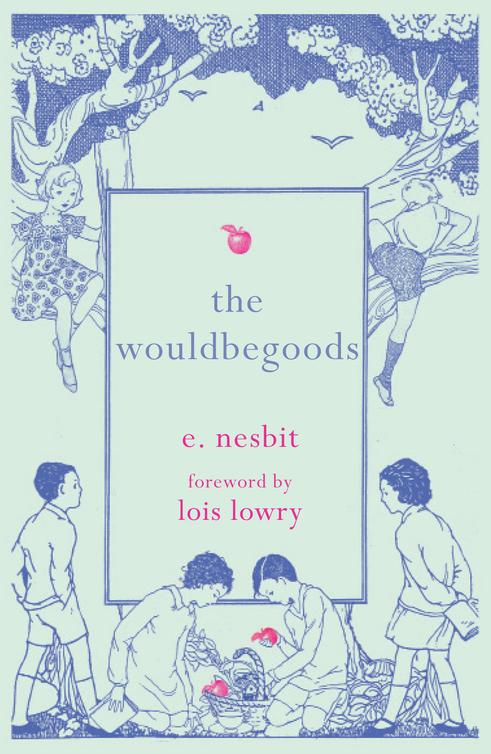The Wouldbegoods
Authors: E Nesbit



wouldbegoods
being the
further adventures of
the treasure seekers
e. nesbit

- Title Page
- foreword
- chapter one the jungle
- chapter two the wouldbegoods
- chapter three bill’s tombstone
- chapter four the tower of mystery
- chapter five the waterworks
- chapter six the circus
- chapter seven being beavers; or, the young explorers (arctic or otherwise)
- chapter eight the high-born babe
- chapter nine hunting the fox
- chapter ten the sale of antiquities
- chapter eleven the benevolent bar
- chapter twelve the canterbury pilgrims
- chapter thirteen the dragon’s teeth; or, army-seed
- chapter fourteen albert’s uncle’s grandmother; or the long-lost
- biographical note
- Copyright
I blame early photography for a misconception. In those turn-of-the-century years when photography was an infant art, subjects were required to sit very, very still for a very, very long time. The well-known Mathew Brady, who documented the American Civil War on film, had no such problem because he was largely photographing corpses. But the living subjects of photographic portraiture invariably had to assume a fairly grim countenance. One can’t hold a wide smile or even a pleasant upturn of the lips for very long.
So, looking at the old pictures, we mistakenly assume that everyone in that era was grim and ill-tempered. At the very least, they had no sense of humour.
We should, of course, know better than this. Mark Twain, though he frowns behind his oversized moustache in every known photo, went down in history as a humourist. Oscar Wilde, seemingly bored and grouchy in front of the camera, wrote the laugh-out-loud funny
The Importance of Being Earnest
.
And so, too, looking at Edith Nesbit – who was of the same era – we see the same phenomenon: a face that appears disgruntled and humourless. The photographs could not be more misleading. The books by E. Nesbit (I’m guessing that she used her initial rather than
Edith because in those years women were always at a disadvantage publicly. Why not, if you could get away with it, pass yourself off as male?) are sparkling with wit and often downright snort-your-coffee-from-your-nose hilarious.
We who write for a young audience are notorious for getting rid of parents. We simply do away with Mother and Dad in heartrending (car accident, plane crash) or too-ludicrous-to-be-tragic (‘Both of them got eaten up (in full daylight, mind you, and on a crowded street) by an enormous angry rhinoceros which had escaped from the London Zoo’) ways. We do this, of course, so that the children themselves can solve whatever problems and obstacles we place in front of them, without parental interference or advice.
So it is no surprise that the Bastable children have been banished to the country, to a remote manor house which their father visits rarely (Mother, of course, is dead, presumably in heaven with many other mothers of fictional children) and which is presided over by the inattentive Albert’s uncle, a writer who requires solitude and emerges only occasionally from behind the closed doors of his study, whereupon he sighs, comments on the latest mess created by the kids, and retreats again.
There are six of them. That is already too many for an author to juggle comfortably, but now, in
The Wouldbegoods
, E. Nesbit has added in two more young hangers-on, Daisy and Denny. So we readers have to keep track of eight children and I, for one, am grateful that Dora, the eldest, is nursing a sore foot and mostly stays in the house amusing herself in some quiet way.
That leaves Oswald in charge. And in fact Oswald is so much in charge that it is he who tells the story, letting himself somewhat off the hook by telling it in the third person (‘Oswald felt that he was really being useful to a suffering fellow creature…’). I should have said telling it mostly in the third person, because Oswald’s frequent lapses into first person voice make him both endearing and irritating as his self-congratulatory pomposity is revealed.
All readers, I suppose, end up with favourites. And for me it is the youngest, who, burdened with the name Horace Octavius, is called H.O. As the siblings – and the visiting Denny and Daisy – rollick about on their misadventures, poor H.O. struggles mightily to keep up, often fails, and sometimes cries. His frustrated wails are more appealing to me than the relentless pluck and bravado of the others, and to be honest I do wish that Noel would curb his tendency to compose – and recite – poetry.
Still, it is the combination of the children, with their different personalities and their incessant bickering, that sets things in motion again and again as they attempt to redeem their previous behaviour and become (or try to become) worthy and admirable. In other words: wouldbegoods, the name they choose only after argument and compromise.
It is for that reason, after all – previous bad behaviour (with the best of intentions, they have ruined their father’s taxidermy collection by trying to create an elaborate ‘jungle’ in the back garden. There was a hose involved) – that they have been ‘sent down into the
country to learn to be good’ and end up at The Moat House. (Have I mentioned that in addition to dismissing parents, authors also like to relocate children? We send our young protagonists off to summer camps, to visit cousins who live on isolated islands, or occasionally to boarding schools, usually an excuse to start fresh, to create and describe a new landscape and culture, something we writers tend to be good at and sometimes show off about.) But goodness –a house with an actual moat! Good for Edith Nesbit, to come up with that one! What youngster doesn’t yearn to live, largely unsupervised, in a house with a moat?
Of course the moat makes for the first disaster. Well, not quite the first. The actual first is the night of their arrival, when H.O. understandably pulls at an unidentified rope, which rings the large bell intended to alert the entire village to a local catastrophe.
As for the next morning’s moat disaster: well, it evolves from a legitimate attempt on the part of the children – ah, the Wouldbegoods – to retrieve a milk pan they have accidentally dropped from a window into the aforementioned moat. The retrieval will be a noble act which they will record in the Book of Golden Deeds created for that purpose.
Of course they must build a raft.
Needless to say they are inexperienced at raft-building.
I own this was rather a bad business, the narrator tells us. Yet we did not do it to please ourselves but because it was our duty.
Disasters arising out of well-intentioned dutiful behaviour are the ongoing motif of the book. Oswald
relates again and again how remorseful the children are after once again things have gone awry for them, as they inevitably do.
When they have inadvertently destroyed a local widow’s garden:
As we went along, full of gloomy remorse
…
After he has drenched the housekeeper when she is headed out in her best clothes: Oswald was not willingly vicious; it was but a light and thoughtless act which he had every reason to be sorry for afterwards.
After the Wouldbegoods have dammed a stream, diverted a waterway, and ruined a local farmer’s barley crop: We said we were sorry. There was nothing else to say, only Alice added, ‘We didn’t mean to be naughty.’
The reader comes to expect and predict each disaster, seeing through the good intentions that open each new chapter, knowing that everything will collapse in the end and there will once again be wails and apologies and punishments and the Book of Golden Deeds will once again be left blank. Why read on, then? Well, why did we go every week as children to see one more episode of
The Three Stooges
? The familiarity of it. The anticipation of the yelps and bonks and nose-twists left us doubled over with helpless laughter and a certain satisfying feeling of being smarter than they are.
A word, though, about… well, about political correctness. There are moments in
The Wouldbegoods
that simply aren’t amusing. The stereotyped assumption, upon finding a baby left alone in its pram (and rescuing it, and adopting it) that it has been kidnapped by ‘gypsies’. The purchasing of a pistol by the children… and then the using of it, albeit by mistake, to kill a fox (and the pistol went off
and the fox died, and I am so sorry). These things just don’t make us laugh these days. Perhaps the most that can be said for such passages is that they can provide a moment for discussion. (‘So, guys, a hundred years ago it was considered okay to –’) Or just close your eyes, breathe deeply, hold your nose, and turn the page.
Although the narrator comments that stories about lovers and getting married are generally slow, the final chapter does include a bit of romance and an engagement (the ‘awfully old’ Albert’s uncle, who at more than thirty decides to marry a lady advanced in years – ‘twenty-six next Christmas’), so everything, including the Book of Golden Deeds, draws to a satisfactory close. Then there was tea, and this all ended in amicableness.
The Wouldbegoods have disbanded. I, for one, am sorry to see them go. But it was time. Even clinging to his third person narrative, as well as his tendency to invent words that suit his mood, Oswald acknowledges that it was time: Oswald can see that ere long he will be too old for the kind of games we can all play, and he feels grown-upness creeping inordiously upon him.
I am going to pour myself a cup of tea now, too, and close the book with a chuckle. Looking again at the photograph of Edith Nesbit, peevish as she seems, I think I can actually glimpse a twinkle in her eye.
– Lois Lowry, 2014

